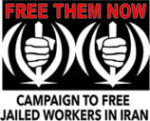Despite the government’s threats and regular violence and fatal attacks by security forces against the people, mass protests throughout the country is going on extensively in full strength in many cities and areas in Iran. Rising petrol prices and the tripling of its rates, which directly affects the price of other commodities, immediately sparked the mass anger and street protests against the astronomical rich top authorities.
These sharp price increase of petrol prices, considering the existing workers’ and employees’ very low wages, that are several times under poverty line, and domination of mass poverty and lack of any social security in Iran; were a huge shock to the people and a basis for the rise of the whole society against the existing system of poverty, discrimination, corruption and oppression. Protests started from the very first day of the price rise namely November 15th and have continued since, and have spread to 140 cities and towns. At the moment many residential areas are under people’s control and the security gangs are not allowed to enter these areas. The protests are going on days and nights all around the country and in some places people strike back on government forces.
Workers are involved in the protests and it is talks about the start of workers strikes in some manufacturing factories. The truck drivers that had a couple of months national strike previously, are talking about starting a strike again. polyethylene Petrochemical company workers started a strike on November 18 and workers of Haft Tapeh Sugar Cane Company went on strike on November 19 and the striking workers rallied through the Shush city to the city Mayor’s Office. The government has shut down many Schools and universities to avoid the risk of the teachers’ and students’ strikes. The market has gone on strike in some cities and these events and strikes have further fueled the general strike discourse.
The families of several thousand detainees are gathering in front of the prisons in cities like Ahvaz, Behbahan, Shush, Omidieh, and some other towns and cities.
The atmosphere of support and solidarity among the people is very high. There has been a sort of council co-operation among the people and the protests have become more organized especially in Khuzestan province cities.
Within the security personnel there is a large scale of discontent and conflicts and it is said that some of them refuse to participate in the protests’ crackdown and even inform security plans to protesters. People burn posters of Khomeini and Khamenei and the flag of the Islamic Republic as a symbol of the government and forty years of repression and corruption, and chant slogans against the Islamic Republic and its leaders. Students at many universities have begun to protest. And in some cities a general strike has actually taken place.
Islamic State authorities have set up emergency meetings in fear of escalating protests to save the government from the situation. Since November 17, the internet has been disrupted to prevent reports of protests. But people in various forms are trying to get their protest reports out to the media. Khamenei has threatened to suppress the people, Rouhani says “the protesters are some mobs and they are nothing” the murderer commanders of the “Revolutionary Guard” are threatening to suppress people. Thousands of demonstrators have been arrested during the protests and a couple of hundreds have been killed by government forces so far, and these crimes have fuled fueled more and more outrage. The regime has even refused to give the bodies of the dead to their families and this is also a matter of public protest in some areas.
The people of Iran over the past three days have put a real fear in the ranks of the government and have gone many steps forward. The protests in recent days in Iran are the beginning of a massive and comprehensive uprising that will put an end to this regime and bring happiness, prosperity, justice, freedom, and a modern, secular, modern political and social system. These protests did not occur unexpectedly. The workers’ protest movement, including the Haft Tapeh Sugar cane workers, the Ahvaz national Steel group workers, Hepco, Azar Ab workers strikes, and the pensioners militant gatherings and teachers’ strikes, also played an important role in changing the balance of power in favour of popular struggles.
Today, the workers and people of Iran need the widest international support. Campaign to Free Jailed Workers (Free Them Now) expects active support from all labour organizations and all humanitarian organizations around the world. You can condemn the repressions by the Islamic regime, including the killings of protesters and mass arrests in any way possible and put pressure on the Islamic regime to release all the recent detainees and all political prisoners immediately and unconditionally and show your support for the mass popular protests in Iran
November 20, 2019
Campaign to Free Jailed Workers (Free Them Now)

